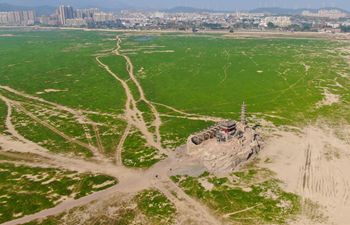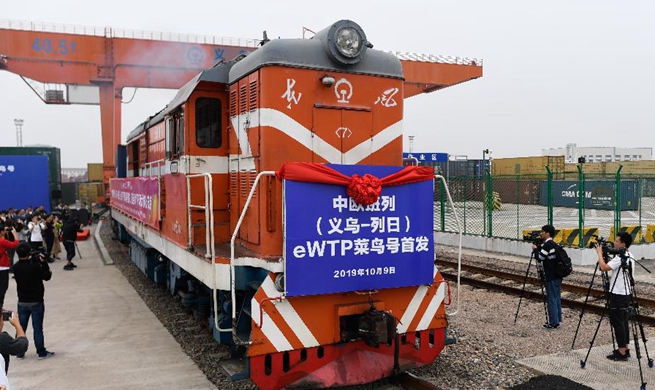DOVER, Britain, Oct. 10 (Xinhua) -- Miroslav Matasic, a Serbian lorry driver, was being held at East Kent customs in Dover, one of Europe's busiest ferry ports and Britain's sea connection to the European Union (EU), for a longer period than usual due to some issues with documentation.
Having been a lorry driver for just over four years, Matasic drives thousands of miles across mainland Europe, from Serbia to Britain, delivering all kinds of products. Various border checks and paperwork approvals add to the time on the road, which for his family means they hardly get to spend time with him.
Now Matasic worries that with Britain due to leave the EU on Oct. 31, he will have to spend even more time away from home.
"I see my family maybe twice a week at most," Matasic told Xinhua. "When Brexit happens, it will be a couple of days in the month, I think. Because I will spend more time at the border, customs and this takes my time."
For non-EU lorry drivers who have just arrived, it is mandatory to go through customs at Dover, even if they have passed through another EU country first. Registered as a non-EU driver, Matasic has just come from France, carrying fresh apples destined for supermarket shelves.
"It takes me one to two hours to get through normally," Matasic said. "But today, because of the issues with documents, it has taken around 20 hours."
Delays at Dover customs are not uncommon, but of the around 10,000 freight lorries that pass through East Kent everyday, just 1 percent pass through customs, which means that Matasic's delay will have little knock-on effect to other non-EU drivers who have just arrived and are awaiting customs checks.
After Brexit, be it deal or no-deal, it will be a completely different scenario: Lorries that come from the EU will have to pass through customs for checks and any minor delays are projected to cause queues for those arriving.
Experts and local traders believed that this will create huge delays and disrupt the supply chain. For fresh food such as apples and medication, the delays could spoil the produce.
"On an average day ... there's 10,000 trucks going in and out of East Kent," John Shirley, founder of freight forwarder John Shirley Ltd in Dover, told Xinhua.
Based on his over 20 years' experience within the industry, and through conversations with others in the freight industry, he is predicting that Dover will become desperately overcrowded.
Officials from the Port of Dover have reaffirmed that the port does not currently have enough space to facilitate an increased number of customs checks, and the maximum capacity for lorries is around 200 to 300 vehicles.
Monitoring the situation closely are the Freight Transport Association (FTA), a UK logistics specialist company, who have been working closely with the government to minimize the effect that these queues could have on those in the freight industry, especially lorry drivers.
But with the government's release last month of Operation Yellowhammer, which spelled out the possible impact of a no-deal Brexit, the FTA have raised their concerns that the effects on the freight industry and lorry drivers may be unavoidable.
In reference to Dover and East Kent, there is likely to be "significant queues," with predicted maximum delays of one and a half to two and a half days, according to the Yellowhammer document.
"Our concerns are that we don't exactly understand what 'border readiness' is," said Heidi Skinner, policy and public affairs manager for the FTA. "The government is not providing us with the entire information and the clarity."
The FTA is increasingly concerned that they cannot give their members accurate information -- including delay times, paperwork required, routes -- on how exactly to prepare for the changes to border entry at Dover.
But Matasic has already experienced first-hand delays when entering the EU from a non-EU country.
"To go into the EU, I need five to 10 hours minimum to pass the border from Serbia to the EU, through Hungary or Croatia, but it's the same," said Matasic. "But when something happens, with documents, people can wait up to one to two days at the border."
Other drivers are also sharing the same concerns, Craig Phillip, a lorry driver from Scotland who has been driving for 25 years in the removal industry across Europe, said all he has been told to do is to get two international driving licenses.
"My journey currently takes two weeks across Europe," Phillip told Xinhua. "After Brexit, it will probably be different because you'll have to stop at every border, hand paperwork over, (and) check the truck ..."
Industry experts estimated that around 50 to 60 percent of drivers are paid by the kilometer, but drivers sitting still in day-long queues will not be paid for that time.
Both Matasic and Phillip told Xinhua that they are expecting to take a financial hit due to Brexit.
The FTA, who works with over 18,000 members to offer advice, believed that alongside the concern of delays and time spent away from home, drivers are frustrated by the lack of information being given to them.
"I hope these kinds of delays will not happen in Dover, (but) if they do, I will have to see if we continue to come here. If I lose too much time, I will not come here, (and) I will go to another country," Matasic said.













